Don't wanna be here? Send us removal request.
Photo










There’s a Starman waiting in the sky, far above the Moon.
David Bowie (1947-2016)
Bye Ziggy.
12K notes
·
View notes
Video
Hi there! Our phrasal verb of the day is “Narrow down”, which means “to reduce the number of possibilities, options or choices.” Here’s our video example! Usage in a movie (“Minority Report”):
- I’m interested in a murder. - I got plenty of those! Kill type? - Drowning. - That narrows it down. Not too many in here for that one. - Victim’s Caucasian, female.
Didn’t understand this phrasal verb? You need example sentences? Want to listen to the correct pronunciation? Try our app for learning English phrasal verbs - click the link - onelink.to/7y3btw
6 notes
·
View notes
Photo








Sometimes I think I have felt everything I’m ever gonna feel. And from here on out, I’m not gonna feel anything new. Just lesser versions of what I’ve already felt.
Her (2013) Dir. Spike Jonze
10K notes
·
View notes
Photo

“Sometimes I think I have felt everything I’m ever gonna feel… and from here on out, I’m not gonna feel anything new.”
Her (2013) dir. Spike Jonze
15K notes
·
View notes
Text
Sweat drips down your face as you held the knife in your hand. If it wasn’t for how loud your heart was beating, you would hear the desperate screams surrounding you. The clock counting down ever so slowly as you close your eyes and take a deep breath.
A siren blared suddenly and you start running to the opposite side of the room. You grabbed whatever you can and bolted back to where you started. Taking a quick glance, you saw how the clock that was once counting down now has one hour timer on it’s screen.
Describe how you’re going to make a four-course meal with your given time frame
2K notes
·
View notes
Text
Korean Idioms
Ok so I’ve noticed a particular phrase get popular recently (at least amongst monbebes) because of something Monsta X’s Minhyuk said in a V Live:

My mouth was bored
Basically this isn’t like a weird phrase he came up with, it’s actually super common! (And we should start using more often in English, too lol)
You know when you’re bored in general and you just want to do something so you start snacking? That’s basically what this means.
The phrase itself is:
입이 심심하다
(Of course you can conjugate it to fit the formality or sentence you’re using it)
617 notes
·
View notes
Text
Korean idioms
환골탈태 - Turning over a new leaf
금상첨화 - The icing on the cake
일사불란 - Shipshape
이열치열 - Fighting fire with fire
���초지종 - The whole story
자수성가 - Self-made
혼비백산 - Frightened to death
비몽사몽 - Half awake and half asleep
유일무이 - One and only
승승장구 - On a roll
힁설수설 - Gibberish
전전긍긍 - Trembling with fear
우여국절 - Twists and turns/ Ups and downs
포복절도 - Fits of laughter
약육강식 - Survival of the fittest
진수성찬 - Delicious feast
양자택일 - Take it or leave it
A&R

2K notes
·
View notes
Text
In Scottish Gaelic we don’t say “You’re welcome” we say “se do bheatha (shay doh veha)” which means “It’s your life” as in “Your life depended on it of course I helped you” and I think that’s beautiful.
Submitted by @fluidpuck
1K notes
·
View notes
Text
Moderately Interesting Japanese Episode 9: Animal Proverbs in Japanese
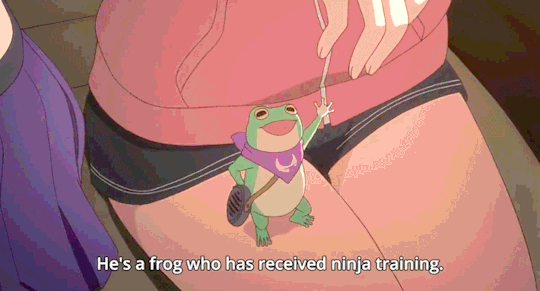
I have no idea what show this is from, but it’s so cute lol
I have a thing for Japanese. As you’ve likely noticed. And there are many aspects of the language that interest me, but one area in particular is 諺 kotowaza, or proverbs.
There are many intriguing proverbs, but today I’m going to focus on those that revolve around animals. How many did you already know?
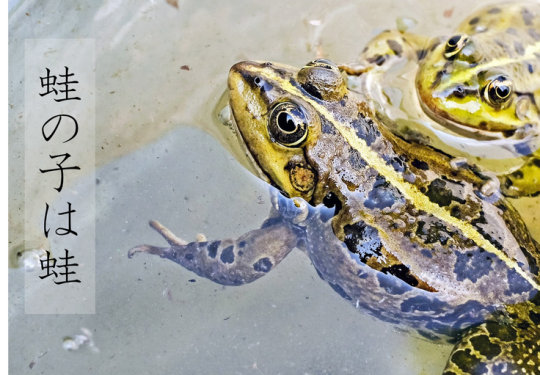
蛙の子は蛙 A frog’s child is a frog
Japanese pronunciation: Kaeru no ko wa kaeru English equivalent: Like father like son.*
I put an asterisk next to the English equivalent because it is not 100% equal. The English expression “like father like son” is often used in a positive light, expressing pride in the child for taking after the parent’s good qualities. It can also be used in a negative way, but I feel that the positive nuance is stronger.
However, the Japanese expression is only negative. When a frog is born it is not a frog but tadpole, which looks like an entirely different animal. Slowly but surely, though, the frogspawn changes until it is identical to its parents. This is a metaphor for children who seem able of surpassing their parents, but who ultimately wind up just like them.
For example, say that there are a mother and father who are not artistically inclined, and their young daughter draws a pretty good picture. They think that she will become a great drawer much better than they could ever be, but as time passes they realize that she is just as mediocre at drawing as they are. They may sigh and say, “Kaeru no ko wa kaeru.”

鹿を追う者は山を見ず He who chases the deer fails to see the forest
Japanese pronunciation: Shika wo ou mono wa yama wo mizu English Equivalent: You cannot see the wood for the trees.
Imagine a hunter who chases a swift deer through the mountain forest. He is so intent on his prey that he does not realize where he going, and by the time he has caught the deer, he is completely lost and darkness is falling. This expression is about people who are so fixated on one thing that they lose sight of other important things.
This expression is very similar to the English “You cannot see the wood for the trees,” which refers to someone who does not notice small but crucial details.

猫に小判 Gold before cats
Japanese pronunciation: Neko ni koban English equivalent: Pearls before swine
A “koban” is a large gold oval coin that was used for many centuries as currency in Japan. You could think of it as a hundred dollar bill in terms of worth compared to other Japanese coinage at the time.
Naturally, while a koban held a large amount of significance for any person, if you gave it to a cat the cat wouldn’t know what to do with it. It would probably give it a curious whiff and then walk away. This expression is used when someone’s gift or efforts are wasted on the recipient. It’s the exact same as the English “pearls before swine.”
Also, as a fun little side-note, anybody who’s in my generation or younger should know this, but can you name the first-generation cat Pokemon that was a Team Rocket henchman? Do you remember what he had on his forehead?
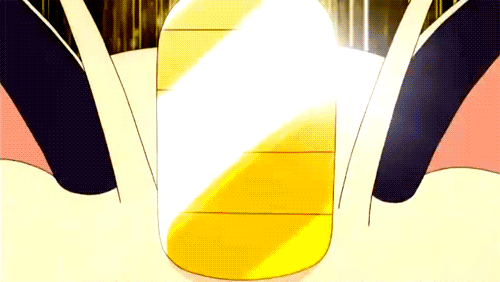
Who’s that Pokemon?! It’s Meowth! The golden coin on his forehead is shaped like a koban and is a reference to this proverb. There’s a fun fact you can share with your Pokemon-loving friends.
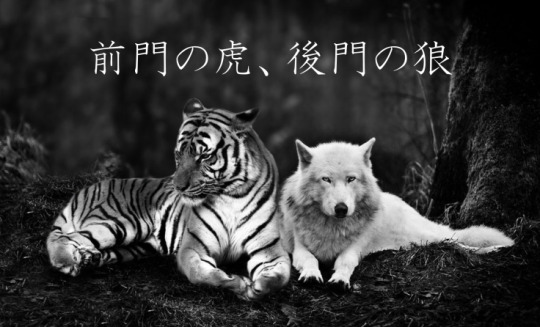
前門の虎、後門の狼 A tiger at the front gate, a wolf at the back gate
Japanese pronunciation: Zenmon no tora, koumon no ohkami English equivalent: Between the devil and the deep blue sea, or, between a rock and a hard place
Imagine that you have sneaked into the enemy’s fortress but were seen by the guards. You must escape through either the front or rear gates of the castle walls, but at the front gates waits a ferocious tiger and at the rear gates snarls a hungry wolf. Either will end poorly for you, yet you must choose one or the other. This expression refers to a situation in which neither of the available options are good.
When thinking of an equivalent English expression, the first one that came to mind was “between a rock and a hard place,” but it turns out that this expression is only about 100 years old. I wanted something with a bit more seniority, and that was when I stumbled across “between the devil and the deep blue sea,” which I had only known as a lyric in an Aerosmith song until then haha. It turns out this expression was first recorded in English almost 400 years ago though.
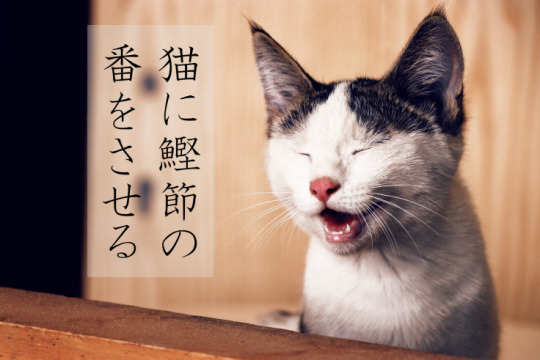
猫に鰹節の番をさせる Setting the cat to guard the dried fish
Japanese pronunciation: Neko ni katsuobushi no ban wo saseru English equivalent: Setting the fox to guard the henhouse
I really like this one. First, you need to know what “katsuobushi” is, which I loosely translated as “dried fish.” It’s actually tissue paper-thin shavings of dried bonito, and cats absolutely love the stuff. And why wouldn’t they? It’s got the strong taste and smell of fish that they crave without the hassle of having to pick out bones or tear through scales.
Therefore, you can imagine that a cat would not a trustworthy guard make. This expression is identical to the English “setting the fox to guard the henhouse.”

They smoke the bonito for a ridiculously long time until it looks like a fossilized banana, and then they shred it up with a fancy box. Voila, katsuobushi.
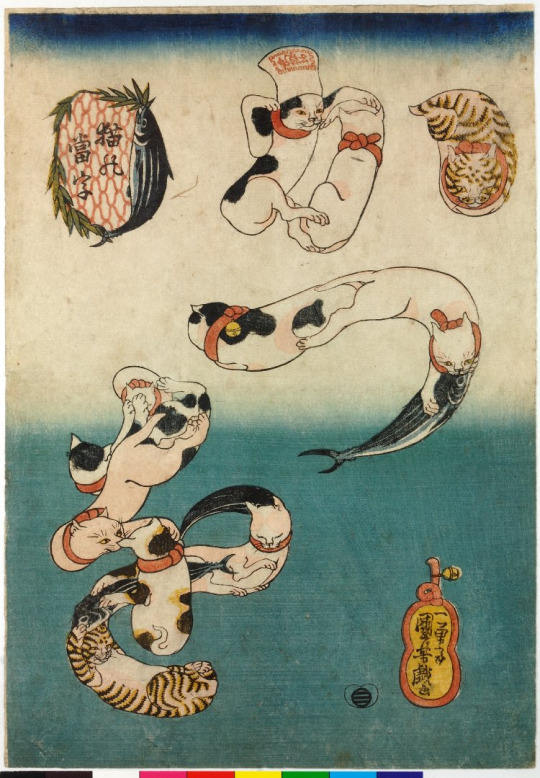
This is an official advertisement for katsuobushi from about 1843. The cats are spelling out かつを (katsuo).
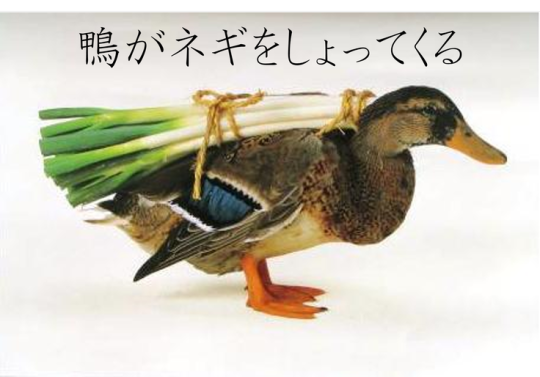
鴨がネギをしょってくる A duck comes bringing leeks
Japanese pronunciation: Kamo ga negi wo shottekuru English equivalent: ??
This one is a bit of head-scratcher lol. First, you need to know that there is a Japanese dish called “kamo nabe,” which is a duck stew with leeks. If a duck comes to you on its own, that in and of itself is a good thing for you. If it is also carrying leeks, it is even better. In other words, this expression is used when two or more convenient/beneficial things happen at the same time.
However, there is another underlying message of this expression that makes it difficult to find a matching English expression. That is, that the duck who unknowingly seals his fate is naive/foolish. Also, a duck is seen as an easy-to-trick or simple-minded bird. (Think of the English expressions “sitting duck” and “lame duck.”)
Specifically, this expression is used when Person A unknowingly does something beneficial for Person B that will later come back to hurt Person A.
I hunted for an equivalent expression in English but couldn’t find one. If you know of one in English or another language, please let me know in the comments!
Also, there is another Pokemon based on this expression. Do you know which one it is?
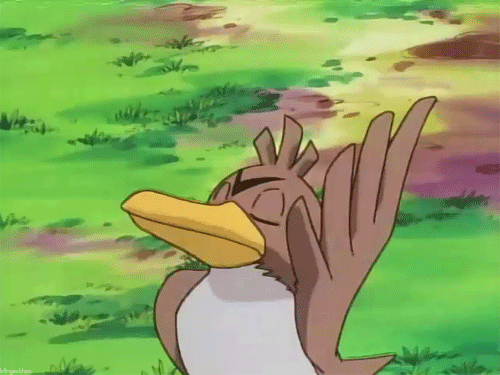
Yep, it’s Farfetch’d! Its name in Japanese is カモネギ (Kamonegi), or Leek Duck. Two Pokemon facts in one post? How much better can it get?
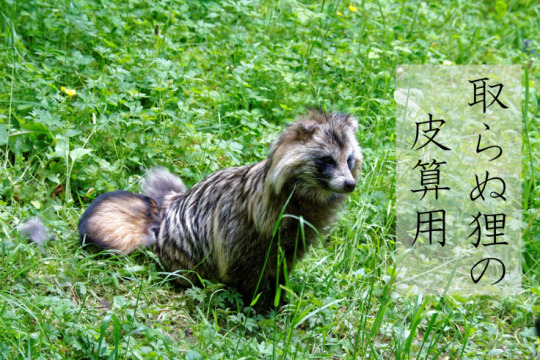
取らぬ狸の皮算用 Counting the pelts of raccoon dogs one has yet to catch
Japanese pronunciation: Toranu tanuki no kawazanyou English equivalent: Counting your chickens before they’ve hatched
The Japanese version of this well-known expression is decidedly darker than the English one. Imagine a hunter laying a dozen traps for raccoon dogs (called “tanuki” in Japanese) and bragging to his friends how he was going to catch 12 in a day. Upon checking the traps, he sees that he has only caught five. His friends would say, “Don’t count your pelts before you’ve caught them.”

立つ鳥跡を濁さず A bird taking flight does not foul the water
Japanese pronunciation: Tatsu tori wa ato wo nigosazu English equivalent: Burn no bridges
This expression can be heard on an almost daily basis in Japan. When a bird takes off from the water, it leaves behind clear, clean water only. There is no trace that it was ever there once the ripples have faded.
This is most commonly used when someone quits their job. It is important to leave no unfinished business or messes for your coworkers to clean up after you, and of course you want to leave on a good note with everyone. When you depart, you should make sure that you leave no unfavorable traces of yourself behind.
I guess that the closest English expression would be “burn no bridges,” though I saw several people stating “It’s an ill bird that fouls its own nest” as an equivalent. I feel like that expression is different, though, because it focuses more on the the perpetrator and less on the people around him, while the Japanese expression is all about making sure not to inconvenience others.
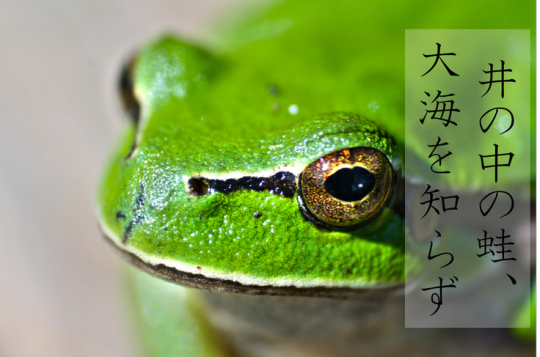
井の中の蛙、大海を知らず A frog at the bottom of a well knows nothing of the great ocean
Japanese pronunciation: I no naka no kawazu, taikai wo shirazu English equivalent: He that stays in the valley shall never get over the hill.
We all know at least one person who is woefully narrow-minded, not for lack of effort but simply because their world extends only to their city limit. They do not travel, do not have friends from varied backgrounds, and do not actively seek out the unfamiliar. This leaves them unaware of all the world has to offer.
The Japanese expression summarizes this predicament beautifully. A frog living in the bottom of a well may think that he is in the great expanses of the sea, but in actuality is in a prison, starved from all the wonders of light and sensation that are waiting outside the well.

The End!!
I hope you guys enjoyed today’s Moderately Interesting Japanese. Work has been…absolute chaos. My old boss was moved to a new project within the company. They’re shorthanded and I’ve been asked to translate over 30,000 pages of high level tech training materials (that I have no experience/knowledge of) into Japanese…in 5 weeks…on top of my regular duties… Needless to say I am exceedingly close either to drinking enough caffeine that my third eye opens, my chakras align, and I become an omnipotent god, or a mental breakdown. But I only have 2,000 more pages to go until I’m finished!
My queue of word of the day posts is running low and it might be a few days until I can get some more ready, but please be patient. I still have tons of cool words I want to share with you! ♡
4K notes
·
View notes
Text
“تقدير په تدبير پورې خاندي Destiny laughs at man’s plans.”
— Pashto proverb
3K notes
·
View notes
Text
Taxidermy
I know that “stuffed my face” is an idiom because you can’t really stuff anyone’s face, unless you are a taxidermist.
5K notes
·
View notes
Text
“ماهرخ”
— Mahrokh, literally “moon-face”. A Persian name chiefly for girls. The moon is associated as one of the highest levels of beauty in Persian culture. To be named this is to be called the silent beauty of a full moon on a clear night.
31K notes
·
View notes
Text
I want emo versions of idioms
Like, instead of ““you’re barking up the wrong tree” it’s “you’re panicking at the wrong disco”
179K notes
·
View notes
Photo

Hello guys! Our idiom of the day is ”Carry the ball”, which means “to be in charge.” ⠀ Origin: this usage comes from such sports as football, where the ball-carrying player gives the team yardage or a touchdown. By the early 1900s it was being transferred to other endeavors.
Didn’t understand this idiom? You need example sentences? Want to listen to the correct pronunciation? Try our app for learning English idioms - click the link onelink.to/zhdnr2
7 notes
·
View notes
Photo

Hi there! 😀 Our idiom of the day is ”Carry the day”, which means “to win, to be successful.” ⠀ Origin: this expression comes from the Latin expression “victoriam reportare”, which means to carry off the honors of the day. This is because the person who won a battle or any other contest would receive a trophy or some other type of reward. ⠀ The winner would get to carry this reward as a symbol of victory. In English, people have been using this expression since at least the 1700s.
Didn’t understand this idiom? You need example sentences? Want to listen to the correct pronunciation? Try our app for learning English idioms - click the link onelink.to/zhdnr2
8 notes
·
View notes
Photo

“I scream the loudest and for absolutely no reason.” - Rigel
20K notes
·
View notes

